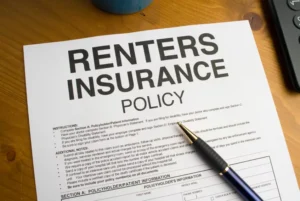How Much Is Renters Insurance Per Month?
Overview On How Much Is Renters Insurance Per Month?
Renters insurance is one of the most affordable ways to protect your personal belongings and provide peace of mind while renting a home or apartment.
Many renters are surprised to learn just how inexpensive this coverage can be. On average, renters insurance costs between $15 and $30 per month in the United States, depending on factors like location, coverage limits, and the type of policy you choose.
Despite its low cost, renters insurance offers valuable protection against losses from theft, fire, or other unexpected events.
Understanding how much is renters insurance costs per month—and what affects those costs—can help you find the best policy for your needs and budget.
What Does Renters Insurance Covers And Doesn’t?
1. Personal Property Coverage
What it covers: Your belongings inside the rental—furniture, clothes, electronics, appliances, jewelry, etc.—if they’re damaged, destroyed, or stolen.
Common perils covered (called “named perils”):
- Fire or lightning
- Windstorm or hail
- Theft
- Vandalism
- Smoke damage
- Water damage from plumbing leaks or overflow (but not floods)
- Falling objects
- Weight of ice, snow, or sleet
Example: If a fire damages your laptop, couch, and clothes, this coverage helps replace them.
Note: Coverage limits apply (e.g., $25,000–$50,000 total is common). High-value items like jewelry or collectibles may need a rider or scheduled personal property endorsement for full protection.
2. Liability Protection (Personal Liability)
What it covers: Legal and medical costs if someone is injured in your rental or if you accidentally damage someone else’s property.
Examples:
- A guest slips in your kitchen and breaks their wrist → covers medical bills.
- Your dog bites a neighbor → covers legal defense and settlement.
- You accidentally start a small kitchen fire that damages a neighboring unit → covers repair costs.
Typical limits: $100,000–$300,000 (you can buy more).
3. Additional Living Expenses (ALE) / Loss of Use
What it covers: Temporary living costs if your rental becomes uninhabitable due to a covered event (like a fire).
Includes:
- Hotel stays
- Restaurant meals
- Laundry
- Pet boarding
Example: If a burst pipe forces you out for two weeks, ALE pays the extra costs beyond your normal rent.
Usually limited to 30–50% of your personal property coverage or a set time period.
4. Medical Payments to Others
What it covers: Minor medical bills for guests injured in your home, regardless of fault.
Example: A friend cuts their hand on a broken glass in your kitchen → covers ER visit (usually $1,000–$5,000 limit).
What Renters Insurance Does NOT Cover
- Flood damage (need separate flood insurance)
- Earthquakes (may need a separate policy)
- Pest infestations (e.g., bed bugs, termites)
- Normal wear and tear
- Your roommate’s belongings (each renter needs their own policy)
- Business equipment (if you run a business from home, may need commercial insurance),
Average Cost Of Renters Insurance Per Month?

The average cost of renters insurance in the U.S. is $15–$20 per month (or $180–$240 per year), according to the latest 2024–2025 data from sources like the Insurance Information Institute (III), NerdWallet, and Policy genius..
Factors That Affect Cost Of Renters Insurance Per Month?
Renters insurance is surprisingly affordable—typically $12–$30 per month—but the exact price varies based on several key factors. Insurers use these to assess risk and determine your premium. Here’s what influences your monthly rate:
1. Location (ZIP Code)
- High-crime areas → Higher theft/vandalism risk → Higher premiums
- Natural disaster zones (hurricanes, wildfires, earthquakes) → Increased rates
- Urban vs. rural: Cities often cost more due to density and crime
- Example: Same policy in Miami (hurricane-prone) may cost 2–3x more than in a small Midwest town.
2. Coverage Amount (Personal Property Limit)
- The more stuff you insure, the higher the premium.
- Common limits: $15K, $25K, $50K, $100K+
- Pro tip: Choose replacement cost (not actual cash value) for better protection—it costs a bit more.
3. Deductible
- The amount you pay out-of-pocket before insurance kicks in.
- Higher deductible (e.g., $1,000) → Lower monthly premium
- Lower deductible (e.g., $250) → Higher monthly cost
- Trade-off: Save $5–$10/month by raising deductible from $500 to $1,000.
4. Liability Limit
- Standard: $100,000
- Higher limits ($300K–$500K) = slightly higher premium
- Recommended: At least $100K (lawsuits can be expensive)
5. Credit Score (in most states)
- Better credit → Lower rates
- Poor credit → Higher premiums
- Note: California, Maryland, Massachusetts ban credit-based pricing.
6. Claims History
- Past claims (even small ones) → Higher future rates
- Claim-free renters often get discounts
7. Safety Features & Building Type
- Lower rates if your rental has:
- Smoke detectors
- Deadbolt locks
- Sprinkler systems
- Security alarms
- On-site management or doorman
- Apartment in a secure high-rise? Often cheaper than a standalone house.
8. Pets (Especially Dogs)
- Certain breeds (Pit Bulls, Rottweilers, etc.) → Higher liability risk → Higher cost
- Some insurers may exclude aggressive breeds or require extra liability
9. Discounts (Stackable!)
- You can lower your monthly rate with:
- Multi-policy (bundle with auto insurance)
- Claim-free history
- Safety devices (alarms, smoke detectors)
- Paperless billing or paid-in-full.
How To Save On Renters Insurance Per Month?
Renters insurance is already one of the most affordable types of coverage, but there are still several ways to lower your monthly premium without sacrificing protection. Here are some of the best strategies to save on renters insurance:
1. Bundle Your Policies
- If you already have other types of insurance—like auto or life insurance—consider bundling them with the same provider. Many insurers offer discounts of 5% to 15% for combining multiple policies.
2. Raise Your Deductible
- Your deductible is the amount you pay out of pocket before insurance kicks in. Choosing a higher deductible can significantly reduce your monthly premium. Just make sure you can afford that amount in case you need to file a claim.
3. Install Safety and Security Devices
- Insurance companies often reward renters who reduce their risk of loss. Installing smoke detectors, fire extinguishers, burglar alarms, or deadbolt locks can qualify you for lower rates.
4. Improve Your Credit Score
- In many states, insurers use credit-based insurance scores to determine premiums. Maintaining a good credit history can help you secure cheaper renters insurance.
5. Ask About Discounts
Many insurers offer additional discounts for things like being claims-free, being a non-smoker, or signing up for automatic payments or paperless billing. Always ask your provider what discounts you might qualify for.
6. Compare Quotes from Multiple Insurers
- Prices vary widely between companies, even for identical coverage. Getting quotes from at least three different insurers helps ensure you find the best deal for your budget.
7. Don’t Overinsure
- Only insure what you truly need. Take an inventory of your belongings and choose coverage that reflects their actual value. Avoid paying for extra protection you won’t use.
Is Renters Insurance Worth It?
Yes — renters insurance is generally worth it for most tenants. For just a small monthly cost (typically between $15 and $30 per month), renters insurance offers valuable protection that can save you thousands of dollars in case of an unexpected loss.
Even though your landlord’s insurance covers the building itself, it does not protect your personal belongings or liability. Renters insurance fills that gap by covering:
- Personal property — Protects your belongings (clothes, electronics, furniture, etc.) against theft, fire, vandalism, or certain natural disasters.
- Liability coverage — Pays for legal expenses or damages if you accidentally cause injury or property damage to others.
- Additional living expenses — Helps cover hotel or living costs if your rental becomes uninhabitable after a covered event.
When you compare the low monthly premium to the potential financial loss from a fire, theft, or lawsuit, renters insurance provides excellent value for the money.
Summary

Renters insurance is definitely worth the cost for most tenants. For an average of $15–$30 per month, it provides valuable protection for your personal belongings, covers liability if you accidentally cause damage or injury, and helps pay for temporary housing after a disaster.
While your landlord’s insurance only covers the building, renters insurance safeguards your own possessions and peace of mind.
Considering the low cost and the high potential financial loss without it, renters insurance is a smart and affordable investment for anyone who rents a home or apartment.


